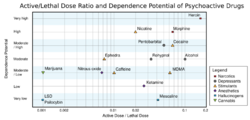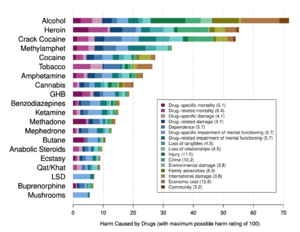Medicine:Drug harmfulness
This article's factual accuracy is disputed. (November 2015) (Learn how and when to remove this template message) |

Drug harmfulness is the degree to which a psychoactive drug is harmful to a user and is measured in various ways, such as by addictiveness and the potential for physical harm. More harmful drugs are called "hard drugs",[1] and less harmful drugs are called "soft drugs".[2] The term "soft drug" is considered controversial by its critics as it may imply that soft drugs cause no or insignificant harm.[2]
Drug policy
The distinction between soft drugs and hard drugs is important in the drug policy of the Netherlands, where cannabis production, retail and use come under official tolerance, subject to certain conditions. The Dutch Opium Law contains two lists of drugs, List I and List II, that are colloquially considered to be lists of hard and soft drugs, respectively. Other countries typically have more than two categories. For example, the United States has five schedules in the Controlled Substances Act or the single convention on narcotic drugs and the single convention on psychotropic substances, ranging from one through five. The United Kingdom has three classes in the Misuse of Drugs Act 1971: A, B and C.
Hard and soft drugs
According to the legal system of the Netherlands; selected soft drugs are tolerated legally while other hard drugs are illegal.[3] Soft drugs can be tolerated in various ways whether it be total lack of regulation or some regulation, but still legal availability to the public.
Gallery
-
A chart showing relative drug harm.[4]
-
A rational harm assessment of drugs[5]
-
An analysis of the dangers of drugs[6]
See also
- Designer drug
- Drug policy of the Netherlands
- Effective dose (pharmacology)
- Effects of cannabis
- Gateway drug theory
- LD50
- Responsible drug use
- Drug Prohibition
- The Rhetoric of Drugs
- Drug discovery
- Prescription drug
- Over the counter drug
- Regulation of therapeutic goods
- Psychopharmacology
- Toxicology
- Pharmacology
Sources
- ↑ Thomas Nordegren (2002). The A-Z Encyclopedia of Alcohol and Drug Abuse. Parkland, Fla.: Brown Walker Press. p. 327. ISBN 1-58112-404-X. https://archive.org/details/azencyclopediaal00nord.
- ↑ 2.0 2.1 Thomas Nordegren (2002). The A-Z Encyclopedia of Alcohol and Drug Abuse. Parkland, Fla.: Brown Walker Press. p. 597. ISBN 1-58112-404-X. https://archive.org/details/azencyclopediaal00nord.
- ↑ "How does the law distinguish between soft and hard drugs? -". https://www.government.nl/topics/drugs/how-does-the-law-distinguish-between-soft-and-hard-drugs.
- ↑ Nutt, David; King, Leslie; Phillips, Lawrence (November 2010). "Drug harms in the UK: a multicriteria decision analysis". The Lancet 376 (November 6, 2010): 1561. doi:10.1016/S0140-6736(10)61462-6. PMID 21036393.
- ↑ Blakemore, Colin; Saulsbury, William; King, Leslie A.; Nutt, David (2007-03-24). "Development of a rational scale to assess the harm of drugs of potential misuse" (in en). The Lancet 369 (9566): 1047–1053. doi:10.1016/S0140-6736(07)60464-4. ISSN 0140-6736. PMID 17382831. https://www.thelancet.com/journals/lancet/article/PIIS0140-6736(07)60464-4/abstract.
- ↑ Fish, Jefferson M. (2006) (in en). Drugs and Society: U.S. Public Policy. Rowman & Littlefield. ISBN 9780742542457. https://books.google.com/books?id=xpZhjBuDkuwC&pg=PA149.
de:Weiche Drogen sv:Lätta droger

![A rational harm assessment of drugs[5]](/wiki/images/thumb/7/7e/Rational_harm_assessment_of_drugs_radar_plot.svg/120px-Rational_harm_assessment_of_drugs_radar_plot.svg.png)


